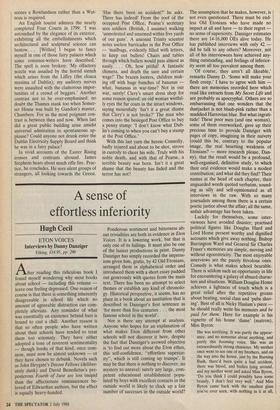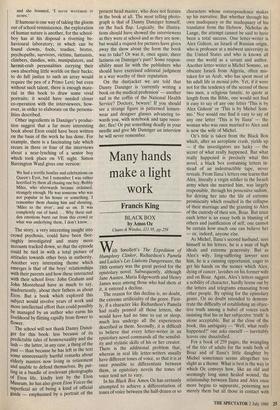A sense of effortless inferiority
Hugh Cecil
ETON VOICES Interviews by Danny Danziger
Viking, £14.95, pp. 290
After reading this ridiculous book I found myself wondering why most books about school — including this volume — leave one feeling depressed. One reason of course is that there is something inherently disagreeable in school life which no amount of agreeable distraction can com- pletely alleviate. Any reminder of what was essentially an existence behind bars is bound to cast a chill. Another reason is that so often people who have written about their schools have tended to treat them too solemnly. They have either adopted a tone of reverent sentimentality — though books of that kind, once com- mon, must now be almost unknown — or they have chosen to debunk. Novels such as John Heygate's Decent Fellows (deliber- ately dank) and David Benedictus's pre- posterous Fourth of June are less insipid than the affectionate reminiscences be- loved of Edwardian authors, but the effect is equally heavy-handed. Ponderous sentiment and bitterness ab- out trivialities are both in evidence in Eton Voices. It is a lowering work, but that is only one of its failings. It must also be one of the laziest productions in print. Danny Danziger has simply recorded the impress- ions given him, gratis, by 42 Old Etonians, arranged them in alphabetical order and introduced them with a short essay padded out generously with quotes from the main text. There has been no attempt to select themes or establish any kind of chronolo- gy. Historical perspective, it seems, has no place in a book about an institution that is described in Danziger's first sentence as 'for more than five centuries . . . the most famous school in the world'.
Nor is there any attempt at analysis. Anyone who hopes for an explanation of what makes Eton different from other schools will not discover it here, despite the fact that Danziger's avowed objective is `to find out more about the Eton ethos, this self-confidence, "effortless superior- ity", which is still coming up trumps'. It may be that there is nothing to discover, no mystery to unravel: surely any large, com- petent educational establishment popu- lated by boys with excellent contacts in the outside world is likely to clock up a fair number of successes in the outside world? The assumption that he makes, however, is not even questioned. There must be end- less Old Etonians who have made no impact at all and have — to their regret — no sense of superiority. Danziger estimates there are 14-16,000 OEs alive today. He has published interviews with only 42 — did he talk to any others? Moreover, not all of his interviewees have achieved any- thing outstanding, and feelings of inferior- ity seem all too prevalent among them.
'Of course, they aren't all likeable,' remarks Danny D. 'Some will make your flesh creep.' I have to agree with him — there are memories recorded here which read like extracts from My Secret Life and are probably as apocryphal. Others are so embarrassing that one wonders that the dustjacket is not blush-pink rather than a muddied Harrovian blue. But what ingrati- tude! These poor men (and one woman), some of them overworked, gave up their precious time to provide Danziger with pages of copy, imagining in their naIvety (could this be, contrary to the popular image, the real besetting weakness of Etonians? — more research please, Dan- ny), that the result would be a profound, well-organised, definitive study, to which their oral evidence would make a modest contribution; and what did they find? Their names at the head of each chapter, their unguarded words quoted verbatim, sound- ing as silly and self-opinionated as all interviews in the raw. With so many journalists among them there is a certain poetic justice about the affair; all the same, unfair advantage has been taken.
Luckily for themselves, some inter- viewees have avoided disaster; practised political figures like Douglas Hurd and Lord Home present worthy and dignified accounts which give away nothing. Bishop Barrington Ward and General Sir Charles Fraser's memories are simple, moving and without egocentricity. The most enjoyable interviews are the purely frivolous ones. Comedy is what makes school bearable. There is seldom such an opportunity in life for encountering a galaxy of absurd charac- ters and situations. William Douglas Home achieves a lightness of touch which is a great relief after the repetitive groans - about beating, social class and `pube shav- ing'. Best of all is Nicky Haslam's piece — he should really write his memoirs and be paid for them. Here for example is his vignette of his house 'dame' (matron), Miss Byron: She was terrifying. It was partly the appear- ance, and no nonsense about anything, and partly this booming voice. She was an extraordinarily strong character. My mother once went to see one of my brothers, and on the way into the house, just by the Burning Bush, there'd been quite a bad accident, there was blood, and bodies lying around, and my mother went and asked Miss Byron, 'Do you think I could possibly have some brandy, I don't feel very well.' And Miss Byron came back with the smallest glass you've ever seen, with nothing in it at all, and she boomed, 'I HAVE WATERED IT DOWN.'
If humour is one way of taking the gloom out of school reminiscence, the exploration of human nature is another, for the school- boy has at his disposal a rivetting be- havioural laboratory; in which can be found clowns, fools, toadies, brutes, psychopaths, survivors, victims, fantasists, climbers, dandies, wits, manipulators, and hermit-crab personalities carrying their own absorbing little worlds on their backs; to do full justice to such an array would require the pen of a Primo Levi; but even without such talent, there is enough mate- rial in this book to draw some vivid portraits; it would have needed closer co-operation with the interviewees, how- ever, in order to elaborate on the persona- lities described.
Other ingredients in Danziger's produc- tion suggest that a far more interesting book about Eton could have been written on the basis of the work he has done. For example, there is a fascinating tale which recurs in three or four of the interviews about a near-lynching of a senior boy which took place on VE night. Simon Barrington Ward gives one version:
We had a terrific bonfire and celebrations on Queen's Eyot, but I remember I was rather horrified by them all chasing one boy, Bobby Miles, who afterwards became ordained, strangely enough. He was someone who was not popular in his house or something. I remember them chasing him and shouting, 'Miles to the river', and so on. It was completely out of hand. . . Why these sud- den emotions burst out from this crowd or what was underlying them, I don't know.
The story, a very interesting insight into crowd psychosis, could have been thor- oughly investigated and many more accounts tracked down, so that the episode could be tied in with a total picture of attitudes towards other boys in authority. Another very interesting theme which emerges is that of the boys' relationships With their parents and how these interacted with their school lives: John Graham and John Moorehead have as much to say, inadvertently, about their fathers as about Eton. But a book which explored this subject would involve years of work and More intellectual effort than could possibly be managed by an author who earns his livelihood by flitting rapidly from flower to flower.
The school will not thank Danny Danzi- ger for this book: less because of its predictable tales of homosexuality and the lash — the latter, in any case, a thing of the past — than because he has left in the text some unnecessarily hurtful remarks about elderly masters now living in retirement and unable to defend themselves. By put- ting in a bundle of irrelevant photographs of Eton life, kindly lent by the Eton Museum, he has also given Eton Voices the superficial air of being a kind of official guide — emphasised by a portrait of the present head master, who does not feature in the book at all. The most telling photo- graph is that of Danny Danziger himself, on the back flap. Logically, the illustra- tions should have showed the interviewees as they were at school and as they are now; but would a request for pictures have given away the show about the form the book was to take? Or was it, once again, sheer laziness on Danziger's part? Some respon- sibility must lie with the publishers who should have exercised editorial judgment in a way worthy of their reputation.
On the dustjacket we are told that Danny Danziger is 'currently writing a book on the medical profession' — another nail in the coffin of the National Health Service? Doctors, beware! If you should see a strange figure in patterned leisure- wear and designer glasses advancing to- wards you, with notebook and tape recor- der, flee! Or put something deadly in your needle and give Mr Danziger an interview he will never remember.















































 Previous page
Previous page